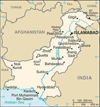
PPG Industries recently agreed to fork over $3.75 million in criminal and civil fines to settle charges that it violated export laws under the EAR. If anyone says the U.S. government is losing interest in enforcing these regulations, you might refer them to this case.
The Pittsburgh-based coatings company pled guilty to charges that, in 2006, one of its Chinese subsidiaries sold a high-performance coating to a Pakistani nuclear power plant. What’s interesting about this case is something we’ve seen from other companies before. Namely, an attempt to follow the law, and when that doesn’t work, an attempt to “skirt the regulations.”
In 2006, the company’s subsidiary – PPG Paints Trading Shanghai – attempted to sell the product to the Cashma 2 Nuclear Plant in Pakistan. According to the BIS, PPG applied for an export license to allow this sale, but that license was denied. After this denial, PPG Shanghai sold the coatings to a third-party vendor in China, who then delivered the shipment to Pakistan. BIS charged the company with falsely reporting that the shipment was for end-use in China. Big mistake!
“[This case should] serve as a warning to corporations that would violate U.S. export laws,” said U.S. Attorney for the District of Columbia Ronald Machen, Jr. “It is not only unlawful, it is also bad business. In this case, the millions in fines to be paid by the corporate defendant are 100 times more than the gross proceeds generated by the unlawful export scheme.”
Bottom line – spending $3.75 million in fines to receive a $37,500 sale just doesn’t add up.
Tom Reynolds is the President of Export Solutions, a consultancy firm which specializes in helping companies with import/export compliance.
